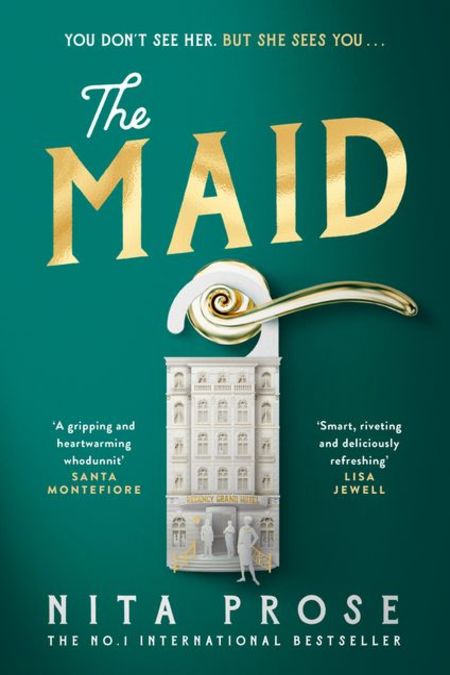People for the most part do not take kindly to those who do not seamlessly blend with the mainstream.
They should because often these people offer, fresh, original perspectives sorely lacking from the usual way of viewing things, but alas, they don’t, too interested in enforcing the security of orthodoxy, forgoing the new and the different for the well-tried and well-known.
Someone who knows this is all to well is Molly the maid, a young lady of unique outlook who works as, you guessed it, a maid at the Regency Grand Hotel, a place where the rich and the famous, and most pertinently for this story, those who subscribe to an orthodox understanding on the world, find a secure place in which to stay, laugh, live and enjoy the fruits of their station in life.
The Maid by Nita Prose is however, less concerned with this glittering ephemera of a world, central though it is to the narrative that sits at the heart of this novel, as she is with the outliers who populate the unseen corners of the hotel, the porters, bartenders, and, of course, maid, who make this place of rarefied luxury possible.
While others might grasp endlessly for the brass ring always tantalisingly out of reach, Molly is happy with her role as someone who makes the bright lights and sparkly pleasures of the guests come alive; in fact, as someone who appreciate the sanctity and safety of rules above all, she values her place as someone who brings order and cleanliness to rooms which all-too-often descend overnight into a mess of riotously narcissistic living.
“I am your maid. I’m the one who cleans your hotel room, who enters like a phantom when you’re out gallivanting for the day, no care at all about what you’ve left behind, the mess, or what I might see when you’re gone …
… I am your maid. I know so much about you. But when it comes down to it: what is it that you know about me?” (Prologue / P. 1)
Where others see a long and exhausting line of tedious task stretching into a limitless horizon, their life one repetitive moment after another, Molly, schooled by her loving grandmother to value certainty and order, rules and treasured edicts for living, sees the chance to make something good out of something bad.
Devoted to the hotel’s creed to return suites to a “state of perfection”, Molly takes everything literally and seriously, her surety and confidence in social settings tempered by an unease that she simply doesn’t get the highly emotive and erratic world around her.
Her sense of security in the ordered routine of her day-to-day life at the Regency is rocked to a fundamental degree when Molly, who takes great pleasure in seeing her newly-laundered uniform hanging from her locker each morning, a talisman of the treasured order to come, discovers a wealthy guest, Mr Black, a man known for his cruel bluster and scornful dismissiveness of those further down humanity’s hierarchy, dead in his bed.
There will be no returning him or his room to a state of anything approaching perfection, no unthinking compliance with simple cleaning and nothing more – it’s never simple for Molly who sees cleaning as something akin to a religious calling as well as a solid, shared bond with her grandmother – and no life untouched by the chaotic world around her.

Not anymore for now Molly is under suspicion, along with everyone else, Mr Black’s death signalling a shift in the way she relates to the hotel, to colleagues like the sweetly charming Juan Manuel in the kitchen or the roguishly handsome Rodney at the bar, or to Mr Black’s wife, Giselle, with whom Molly has, quite unexpectedly and unaccountably, forged a rich and intimately personal friendship, the kind that maids rarely, if ever, enjoy with socialites.
Written with rich empathy and an insightful ability to bring forth the outliers to the extent that we can appreciate how beautifully different and alive they are – full disclosure: this reviewer grew up as a gay kid bullied every day of his life and knows all too well how little the mainstream understands those beyond it’s narrowly banded periphery – The Maid is a stunningly immersive character study meets whodunnit which places a real value, much like Eleanor Oliphant is Completely Fine, on taking the time to get those who often escape the attention of the mainstream.
Molly is, however, you approach her a gem; not simply because her difference is lauded and valued but because Prose at no time presents her as perfectly infallible capable of no wrong.
While the book does have some fairytale aspects to it, particularly in its welcome but sometimes fraught final act, and Molly is, by and large, a well-intentioned, caring person with only the best interests of everyone at heart, she is not perfect, and it’s that infallibility, not driven by nastiness or brokenness, simply garden variety humanity, that gives The Maid such a tremendous amount of compelling heart.
“It’s time.
This is the only part of the plan that I have kept to myself all this time. I never shared it with anyone – not with Mr Preston or Charlotte or even Juan Manuel. There are still some things that only I know, things only I can understand because I’ve lived them. I know what it’s like to be alone, to be so alone that you make the wrong choices, that out of desperation you trust the wrong people.” (P. 270)
You love Molly because she is lovably good and fallibly imperfect, and it is this richness of innocent everyday humanity that fuels the beguiling narrative of The Maid which flows along on a richly poignant raft of adroitly-delivered writing, casting a fetching shadow of mystery and injustice, of hope and fear, a mixing of emotions that never veers into melodrama but always stay solidly in line with a story that goes to some uncertain places but always with Molly as its moral compass.
Much of the charm of The Maid comes from the fact that Prose never once forgets that we are here for Molly and her different outlook on the world; while others may mock and judge her, and you will find yourself so endeared by the protagonist that fury will regularly well up within you at the thoughtlessly blinkered way people treat her and dismiss her refreshingly left-of-field in insights, you will come to adore and love her, and more importantly, to appreciate how her different way of seeing the world, is in fact a gift everyone else could benefit from having.
People may dismiss maids, or for that matter checkout operators or cleaners or anyone who occupies spaces outside of the liminal, but to do so, as countless people in The Maid do, aside from some key allies who are unconditionally there for Molly when she needs them, is to miss out on a unique vantage point on life, friendships and love, and most specially for this marvellously invigorating book, whodunnits.
Granted, very few of us find bodies or having to explain our rules in finding them, and so much of The Maid‘s central narrative may not directly apply to us, thrillingly intriguing though it is to read, but what should impact us, and often does, is a renewed appreciation of the fact that the obvious viewpoint is not always the whole or only answer and that we would do well to listen to the Mollys of the world who see more and know more than anyone ever gives them credit for, and who may yet surprise us with the things they know.
